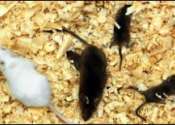Micro transistor prototypes map the mind
(Phys.org) —To make better mind maps, a group of French scientists – building on prototypes developed at the Cornell NanoScale Science and Technology Facility (CNF) – have produced the world's first microscopic, organic ...








.jpg)